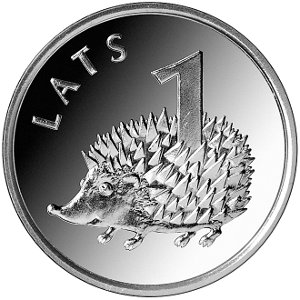(UPDATED, June 9: Correction made, thanks to an observant reader. We confused Latvia with Lithuania in one instance.)
This week Latvia became the 18th country to join the Eurozone. It’s easy to mistakenly equate “Europe”, or even “Western Europe”, with “nations that use the euro”, but there are some glaring omissions:
- United Kingdom
- Norway
- Sweden
- Denmark
- Switzerland
Latvia becomes the 2nd former Soviet republic to join up, following Estonia in 2011. By this time next year Latvia’s current currency, the lats, will go the way of the franc (French, that is. The Swiss is very much alive) and the Deutschmark.
The Eurozone isn’t come-one come-all, like the Universal Life Church is. There’s a membership committee, a list of benchmarks you have to meet, even something of an apprenticeship program. So in that respect the Eurozone is more like a college fraternity. Specifically, any aspiring member has to spend 2 years in the European Exchange Rate Mechanism.
The hell is that?
It’s a precursor to the euro, developed in the late ‘70s. The idea was that since the major countries of free Europe planned to eventually unify their currencies, those currencies should be allowed to trade only in narrow ranges before unification. The mechanism was supposed to be a compromise between formally tying one currency’s value to another (like the Bahamian dollar is pegged to the U.S. dollar), and running the risk of one currency being arbitrarily devalued with respect to another (like the Zimbabwean dollar and everything else in the world.) So the lira could only trade between, let’s say, 200 and 250 to the peseta. That’s a gross simplification – the bands were usually narrower than that, except for certain currencies, and those only at certain times – but we try not to overwhelm you with semi-relevant data here. Anyhow, the lats now trades within 1% of the euro, which will be irrelevant a year from now when the lats goes defunct.
For what it’s worth – $1.89 right now – the lats is the 4th most valuable currency on the planet. And Latvian inflation is minimal, around 1.3%. Which makes sense, given the mechanism. Which brings up a question:
Why would Latvia join a club that would have Greece as a member?
The short answer is “politics”. See the line above about Estonia being the only former Soviet republic that uses the euro officially. Of the 6 unambiguously European former Soviet republics excluding Russia (the other 4 are Lithuania, Belarus, Ukraine and Moldova), each has had to make a momentous decision: embrace the West and all the resultant benefits from doing so, or set the clock back a few decades and re-hitch the wagon to Russia?
Belarus chose the latter, the others the former to varying degrees. By adopting the euro, it makes it extremely difficult for Latvia to fall under Moscow’s influence yet again. Short of an invasion, anyway, and if you think that sounds drastic tell it to the old Latvians who vividly remember the Soviet tanks rolling into Riga in 1940.
Is the euro shaky? Less so than a year ago. The bailouts have stopped, largely because the pool of rich nations to “borrow” from is finite. But more importantly, Latvia doesn’t exist in a vacuum. There are only certain options for its short-term economic future at its disposal, and maintaining the lats isn’t one of them. Joining the Eurozone is the least bad choice at Latvia’s disposal, and it might even turn out to be a good one. Besides, the nation can’t exactly backpedal after consenting to the exchange-rate mechanism in the first place. Extricating would be impossible, and probably not in Latvia’s best interests anyway.
Is this just a piece of international finance and geopolitical esoterica, or does it mean anything to your life? Well, first of all it doesn’t hurt to know a little more about how exchange rates work and how the euro gradually envelops the currencies of Europe into its cocoon of horror (awkward simile ©Peter McNeeley, 1996.) Second, damn straight there’s a microeconomic lesson here. If you need to put food on the table, you take the steady job (Eurozone membership) over the risk of unemployment (a currency of limited utility, and besides euros are accepted throughout Latvia anyway and have been since their inception.)
Criteria for membership in the eurozone are not trivial nor easily achieved. Latvia’s economy is humming, at least relative to its former Soviet counterparts. Its gross domestic product per capita is 50th in the world, and there are 200-odd countries across the globe. Once you start the conversion to the euro, it’s hard to go back, which is why the United Kingdom (wisely) never started. Accepting Eurozone membership now, effective in 2014, also puts Latvia ahead of the next countries scheduled to join: its neighbor and rival Lithuania, and Old Europe mainstay Denmark. The imprimatur of the euro distinguishes Latvia as a promising economic force. Also, symbiotically, it strengthens the euro’s status as a currency of importance. The more members the Eurozone has, the greater the likelihood of the euro supplanting the U.S. dollar as the international reserve currency of choice.




